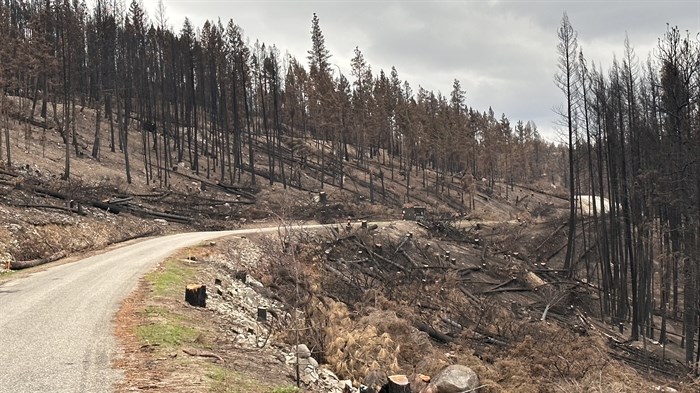
FILE PHOTO - Forest near West Kelowna burnt by last summer's wildfires.
(GEORGINA WHITEHOUSE / iNFOnews.ca)
April 19, 2024 - 2:41 PM
Community members and environmental organizations recently gathered to discuss their discontent with the state of forest protection in BC at a town hall meeting.
Attendees at the April 13 meeting expressed frustration with the government's recent change in pricing and procedures for forest salvaging in the wake of wildfires.
"The government is telling us that to help communities, they're going to make the access into all burned areas of BC easier, they're going to give the industry, and loggers, and forest corporations, easier access, less red tape and no environmental protection agencies to access all the burned lands.
"You know why? Not for community health, not for forest health, not for ecosystem health and not for community safety or water health, but just to get more money for the sawmills, more trees for the sawmills and more profits for the industry. It is strictly an economic endeavour," Taryn Skalbania, Founder of the Peachland Watershed Protection Alliance and Co-Founder of the Interior Watershed Task Force said.
"We need our forests standing behind us for wildlife, for habitat, for water, we don't need more two-by-fours from sawmills."
On April 10, the BC Ministry of Forests announced a change in the Interior Appraisal Manual which will make it easier and cheaper for timber companies to access forests and the timber in them in the wake of wildfires.
READ MORE: B.C. makes it easier to salvage timber damaged by wildfires
Skalbania said the change in policy will be detrimental to forests, wildlife, water protection and communities around the province.
"With this new wildfire access mitigation logging - they call it salvage logging even though there's no salvaging - they don't have to limit the size of their clearcut as previous laws regulated; it can be thousands of thousands of hectares, and they can be right next to old cut logs or right next to roads, right next to lakes, right next to community boundaries, so there's no limitation to size or proximity," she said.
"The red tape is really being minimized; they don't have to ask First Nations, they don't have to ask for permission to put in roads, they don't have to ask for slope stability, they don't have to ask for species-at-risk studies, they can just go in, so it's a real Trojan horse."
Skalbania wants to see a change in the way the government views forests across the province and a change in policies.
"Because it has worked for the past 100 years, it's easy for the government to continue down this path... a forest is worth far more standing than it is as palettes or paper or toilet paper, so we need a societal change," she said
The outrage surrounding forest protection policies also comes from the fact that the current climate crisis isn't being taken into consideration in these policy changes, Skalbania said.
"Only recently, did forestry start to replant trees, but I could take you on a tour of our watershed, in Peachland alone, and hundreds and hundreds of old clear-cuts have been replanted, but are failing to grow, they just don't grow very quickly in the Okanagan. Trees are growing less than six inches a year and some are not growing at all."
The average pine tree grows one to two feet a year which is the main tree species used in replanting in the region.
Town hall-goers want the government to stop prioritizing the profits made by the timber industry and start putting the welfare of forests and wildlife ahead of them and they fear the rate at which trees are disappearing in the province.
One of the actions the environmental groups have taken is a petition asking for better protection of BC's watershed from clearcutting. To find out more about the town hall meeting and the movement, visit the Evergreen Alliance's website here.
— This story was corrected at 12:05 p.m. Monday, April 22, 2024 to clarify pine trees are used for replanting.
To contact a reporter for this story, email Gabrielle Adams or call (438) 830-1211 or email the editor. You can also submit photos, videos or news tips to the newsroom and be entered to win a monthly prize draw.
We welcome your comments and opinions on our stories but play nice. We won't censor or delete comments unless they contain off-topic statements or links, unnecessary vulgarity, false facts, spam or obviously fake profiles. If you have any concerns about what you see in comments, email the editor in the link above. SUBSCRIBE to our awesome newsletter here.
News from © iNFOnews, 2024